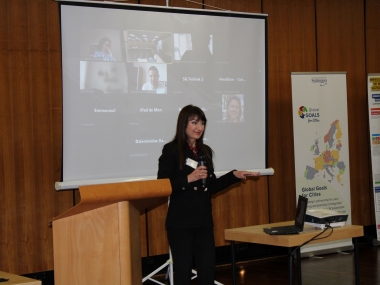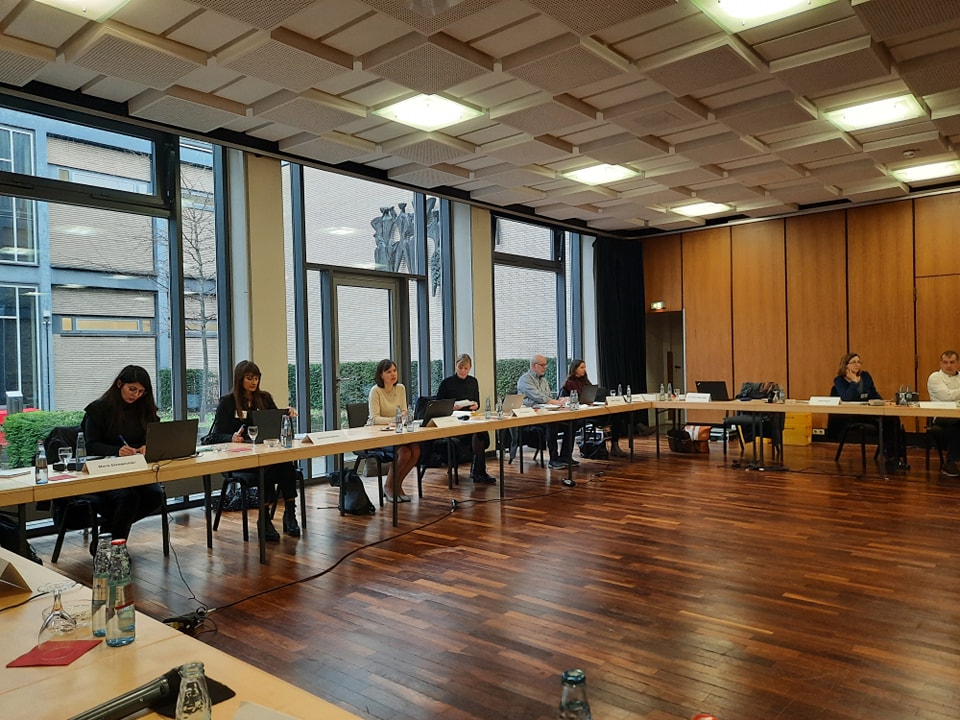Insights from Heraklion, the co-host of TM6
Edited on
11 May 2022The city of Heraklion was the co-host of the 6th Transnational Meeting which was held between 5-8 April 2022 in Solingen, Germany along with Solingen and Tallinn.

Our theme was the Localization of the Sustainable Development Goals in the Municipality of Heraklion. Renia Drosou, Head of the Directorate of Programming, Planning and ICT of the Municipality presented Heraklion’s work on sustainability, including its collaboration with the University of Crete on SDG localisation. 
Heraklion’s vision is to be “Smart, Resilient and Livable”. The four general Objectives of Heraklion’s Strategic Plan are:
- Upgrading the quality of life of citizens
- Effective management of the health and social crisis
- Support and encourage the local economy, development and innovation
- Sustainable and efficient Municipality, in environmental, social and economic terms
Relevant Thematic Strategies of the Municipality of Heraklion:
- The Integrated Urban Intervention Plan
- The Sustainable Urban Development Strategy
- The Strategic Plan for the "Smart City”
- The Strategic Plan for the “Resilient City“
- The Sustainable Urban Mobility Plan
- The Local Strategic Plan for Lifelong Learning "Heraklion - A city that learns”
- The Business Plan of the Tourism Promotion of the Municipality
- The Sustainable Energy Action Plan in the framework of the "Covenant of Mayors" for climate change
- The Local Waste Management Plan of Heraklion
The integration of SDGs, the strengthening and integration of environmental, social and economic sustainability in the strategy, planning and practice of the Municipality, is expected to upgrade the developmental perspective of the Municipality of Heraklion.
Municipality of Heraklion collaborated with the University of Crete, towards the localization of the Agenda 2030. The two main parts of this collaboration were the Analysis of the Municipality of Heraklion’s Strategic Plan incorporating its thematic strategic plans and the Identification of the Municipality of Heraklion’s development goals linking them to the SDGs. The following development goals emerged from this collaboration:
1: Cohesion in the economy
2: Cohesion in the city
3: Cohesion in society
4: The learning city
5: Sustainable tourism development
6: Sustainable energy and waste management
The Municipality of Heraklion presented in detail the proposed actions per development goal.
The Municipality of Heraklion also presented important projects that have been implemented in the Municipality such as the project “A2UFood”, a circular economy project which proposes a holistic management scheme in which all aspects of reduction, reuse, and recycling of food waste are included.
The Actions of the project were: Software to support families and hospitality sector in reducing avoidable food waste, training seminars for citizens, a bioplastic production unit for the production of compostable bags and a range of state of-the-art Autonomous Composting Units (ACUs) where treatment takes place on-site.
The ECOROUTS (Interreg Greece-Cyprus) introduces electric propulsion in public transport. The Municipality of Heraklion has purchased two electric buses and has created the GREEN ROUT which passes by and highlights cultural and historical monuments in the city center and contributes to the reduction of carbon dioxide and other gaseous pollutants. A parallel goal of ECOROUTS is also to raise public awareness on green issues.
While a brief reference was made to the projects that are now being implemented in the Municipality of Heraklion such as the INTERREG V-A Program "Greece - Cyprus 2014-2020", with the acronym "UPGRADE". The program focuses on the Transformation of two emblematic buildings of special historical, social and architectural significance into high energy efficiency buildings, the Heraklion City Hall (Loggia Building) as well as the Presidential Palace of the Republic of Cyprus.
Municipality of Heraklion will create the Integrated Action Plan in the context of the GLOBAL GOALS FOR CITIES project and already scanning opportunities and working with the operational program managers to identify potential funding for the IAP. As an example, the city has submitted an expression of interest to become one of the 100 climate neutral cities for the EU mission on the theme.
Submitted by Karin Luhaäär on
